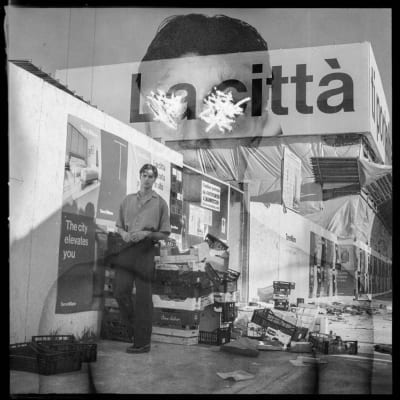
La Città
"La Città" is an external projection of the emotional state of the protagonist, but it is also a macrocosm, a place of an experience of reality, in which the crowd of things and people inhabits a space without actively participating. The short film is a tribute to idependent and avant-garde cinema, in particular to the films 'Funeral Parade of Roses' by Toshio Matsumoto (1969) and 'Fireworks' by Kenneth Anger (1947). In fact, the protagonist finds himself fighting an inner battle made up of extreme self-consciousness and past traumas, a battle that pushes him to 'blind' the Matthew of yesteryear by burning the representation of what he was, enclosed in a photo. It is this self-consciousness (which harks back to the Greek 'ὕβρις') that drives the protagonist to isolate himself, feeling so different from the city, from the macrocosm that surrounds him, an insecurity masked by pride and a sense of superiority. He feels he is playing a role that is not his own, he therefore wears a social mask that allows him to hide the painful reality from his eyes. A reality he is however forced to come to terms with when the mask falls once he is truly alone. Matthew blinds himself in a desperate attempt to erase the wounds of the past and at the same time protect his present from an overly harsh reality, just as Oedipus did in Sophocles' tragedy.
La Città
"La Città" is an external projection of the emotional state of the protagonist, but it is also a macrocosm, a place of an experience of reality, in which the crowd of things and people inhabits a space without actively participating. The short film is a tribute to idependent and avant-garde cinema, in particular to the films 'Funeral Parade of Roses' by Toshio Matsumoto (1969) and 'Fireworks' by Kenneth Anger (1947). In fact, the protagonist finds himself fighting an inner battle made up of extreme self-consciousness and past traumas, a battle that pushes him to 'blind' the Matthew of yesteryear by burning the representation of what he was, enclosed in a photo. It is this self-consciousness (which harks back to the Greek 'ὕβρις') that drives the protagonist to isolate himself, feeling so different from the city, from the macrocosm that surrounds him, an insecurity masked by pride and a sense of superiority. He feels he is playing a role that is not his own, he therefore wears a social mask that allows him to hide the painful reality from his eyes. A reality he is however forced to come to terms with when the mask falls once he is truly alone. Matthew blinds himself in a desperate attempt to erase the wounds of the past and at the same time protect his present from an overly harsh reality, just as Oedipus did in Sophocles' tragedy.
To report inappropriate content, an infringement of copyright, or to report a problem on the Portfolio platform, please contact the Digital Team
